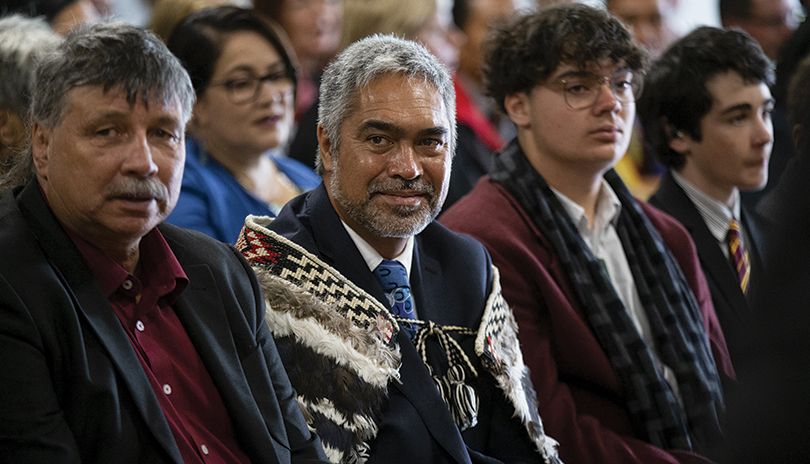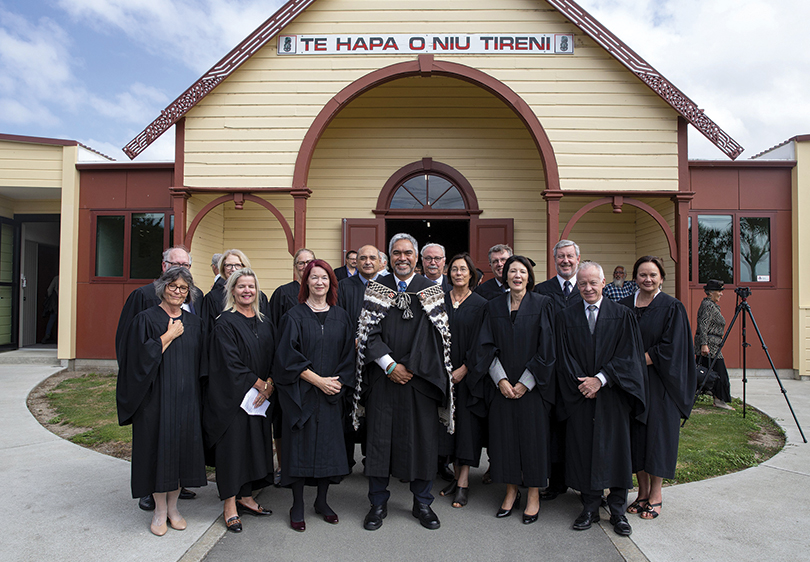Bringing tikanga Māori into the courtroom
Mar 27, 2020

Quentin Hix (Ngāi Tahu – Arowhenua, Waihao, Moeraki) has recently been appointed as a District Court Judge. Kaituhi Shabnam Dastgheib sits down with Quentin to learn more about his intention to observe tikanga Māori in the courtroom, and bring empathy and connection to the judiciary.

Above: Quentin (second from left) with sons Abraham and Solomon during his swearing in ceremony at Arowhenua Marae.
Quentin Hix decided to pursue a career in law after a conversation with his deputy principal at Temuka High School.
“When I came to leave high school, the deputy principal called me into the office and said, ‘What are you going to do?’ I said, ‘I don’t know’, and he said I should go into the army.”
But Quentin said he couldn’t be bothered getting up early in the morning and shining his shoes. The deputy principal asked what he did want to do, and his flippant answer at that young age was that he just wanted to make money.
“His response was to be a doctor or lawyer. I said, ‘I can’t be bothered getting up early in the morning and delivering babies, so I’ll go lawyer then.’”
He laughs about that little exchange now, with many years of success in the profession behind him. As one of the country’s newest judges, Quentin is now on a mission to bring his own personal style to the District Court.
Speaking after his first full day of running a courtroom, Quentin said his swearing in on 29 February had special significance for him, as it took place at his tūrangawaewae. The long-serving Timaru lawyer was sworn in as a district court judge at a special sitting of the Timaru District Court at Arowhenua Marae. Hundreds were there, including Chief District Court Judge Heemi Taumaunu, and of course, Quentin’s whānau and members of the wider Arowhenua community.
Quentin has held various roles for Arowhenua, including serving as the chairman and secretary, and as the Arowhenua representative on Te Rūnanga o Ngāi Tahu from 2010 to 2019. He has also served just over eight years as a director of Ngāi Tahu Holdings.
Among his other roles, he is a director of Dunedin City Holdings, the investment arm of the Dunedin City Council; and director and deputy chair of the Crown Research Institute, ESR. In 2018 he was appointed a member of the Safe and Effective Justice Advisory Group Te Uepū Hāpai i te Ora, a committee set up to explore and make recommendations to Government for improving the criminal justice system.
Quentin played sports growing up, and has taken that competitive streak into his law career with him, as well as a passion for helping the underdog. This desire to sort things out for people began at a very young age.
He was voted onto the school council in high school, and says he learnt a lot of things there about decision-making and negotiating. He also learnt from his parents, who were keen contributors to their marae and the wider community.
“My mother was involved in an awful lot of community activities. A lot of Temuka-based clubs and things. Mum and Dad would not only have us involved, but they’d also get on the committees.”
Quentin took degrees in law and commerce from the University of Canterbury, and began his law career in Ōtautahi in 1989, moving back to Timaru in 1992. He became a partner in 1994. Since 2004 he has practised at his own firm, now known as Quentin Hix Legal.
He lives in Timaru with his wife Kathy and his two boys, but the family will soon relocate to Christchurch, where he will be based.
After initial nervousness at being in charge of a courtroom, Quentin says it took only a few cases for him to find his groove, and he is loving the experience.
He likens it to running out on a sports field for the first time in terms of the nerves and adrenaline.
The challenge for him will lie in finding a balance between speaking with everyone and giving them the time they deserve, and making sure the courtroom is running efficiently.
“The thing about being a judge is you get to make a decision at the end of it. Which is the ultimate responsibility, and I take that very seriously. One of the key things for me is developing my own personal style,” he says.
“I want to engage as much as I can with the client directly, and try to use language that they understand. You’ve only got a limited amount of time so if you sit there and have a good old chat with everyone, you’ll be there all night.”
Being of Ngāi Tahu descent and one of the few Māori judges in the country brings great responsibility, but Quentin is not one to shy away from what is expected of him.
“I embrace that challenge and I’ve been told by others, ‘We expect big things of you’. That’s fine. I’m used to high expectations.”

Above: Twenty-one newly sworn in district court judges including Judge Quentin Hix front and centre at his tūrangawaewae, Arowhenua Marae.
For those who come to court, research shows that the most important person to them is not any of the lawyers, but the judge. Quentin hopes that if Māori are in court, there might be a positive in seeing him in the judge’s chair.
“If you’re a young Māori man and you come up and you look up and you see a Māori face looking back at you, then hopefully their interest in engaging with the process is heightened, just because they look up and see not what they’re expecting to see – in other words an old grey-haired white guy.”
And hopefully that might actually follow through with doing their community work and progressing through their rehabilitation.
“They’re more likely to do that if it’s someone that looks like their uncle telling them.”
The need to get it right on decisions that may mean prison weighs heavily on Quentin.
“Yesterday I had to decide whether someone got bail or not. Effectively I sent someone back to jail. He was standing in front of me, and I could have sent him two ways: I could have sent him one way to his partner and family, or I could have sent him back through the door he just came out of.
“Unfortunately for him — and it weighed on my mind — I tried to keep him out of there, but I couldn’t. It’s the ultimate responsibility, because you’re dealing with people’s liberty. The law is the law, and you need to comply with the law. You can’t just make rules on the fly.”
However, within those constraints, there is still real scope to express his personal values.
“First step is demonstrating empathy and connection, particularly at that Māori level; so that Māori clients coming through feel as though they are being listened to and that tikanga, where it applies, is being observed. So that’s setting a personal example.”
Quentin says he also hopes to educate his fellow judges in the best ways to engage with Māori within the courtroom setting. He says so far, he has seen willingness and even eagerness from other judges to better engage with Māori. However, there is also some hesitancy, as some are afraid to get it wrong.
“Find what you’re passionate about and do that. First, if you like the law, then keep going. Find the area of law you like and do that. Avoid being pigeonholed – there are no ceilings or barriers. The only barrier is in your own mind, at the end of the day.”
Quentin Hix (Ngāi Tahu – Arowhenua, Waihao, Moeraki) District Court Judge
In recent years, both in general society and the judiciary, he has seen a huge improvement in openness and enthusiasm for all things Māori.
“In the last five years, getting on a te reo Māori course has become really difficult, because they fill up really quickly. But that’s only happened in the last five years. There’s been a tipping point; and the judiciary as a whole have reached that tipping point, or are interested in getting over it.”
For anyone hoping to follow his footsteps through a law career and on to becoming a judge, Quentin says the most important thing is to stay true to your own beliefs and desires.
“Find what you’re passionate about and do that. First, if you like the law, then keep going. Find the area of law you like and do that. Avoid being pigeonholed – there are no ceilings or barriers.
“The only barrier is in your own mind, at the end of the day. Seek out good mentors and engage with them and listen to them. Not everything they say is 100 per cent right; but you moderate that with advice you get from other mentors, and you find your own way.”
Quentin is one of 21 new judges appointed across Aotearoa. His appointment comes as part of the Government’s efforts to improve access to justice and boost diversity. Ten of the new judges are Māori, eight are Pākehā, one is Māori/Chinese, and two are Samoan.